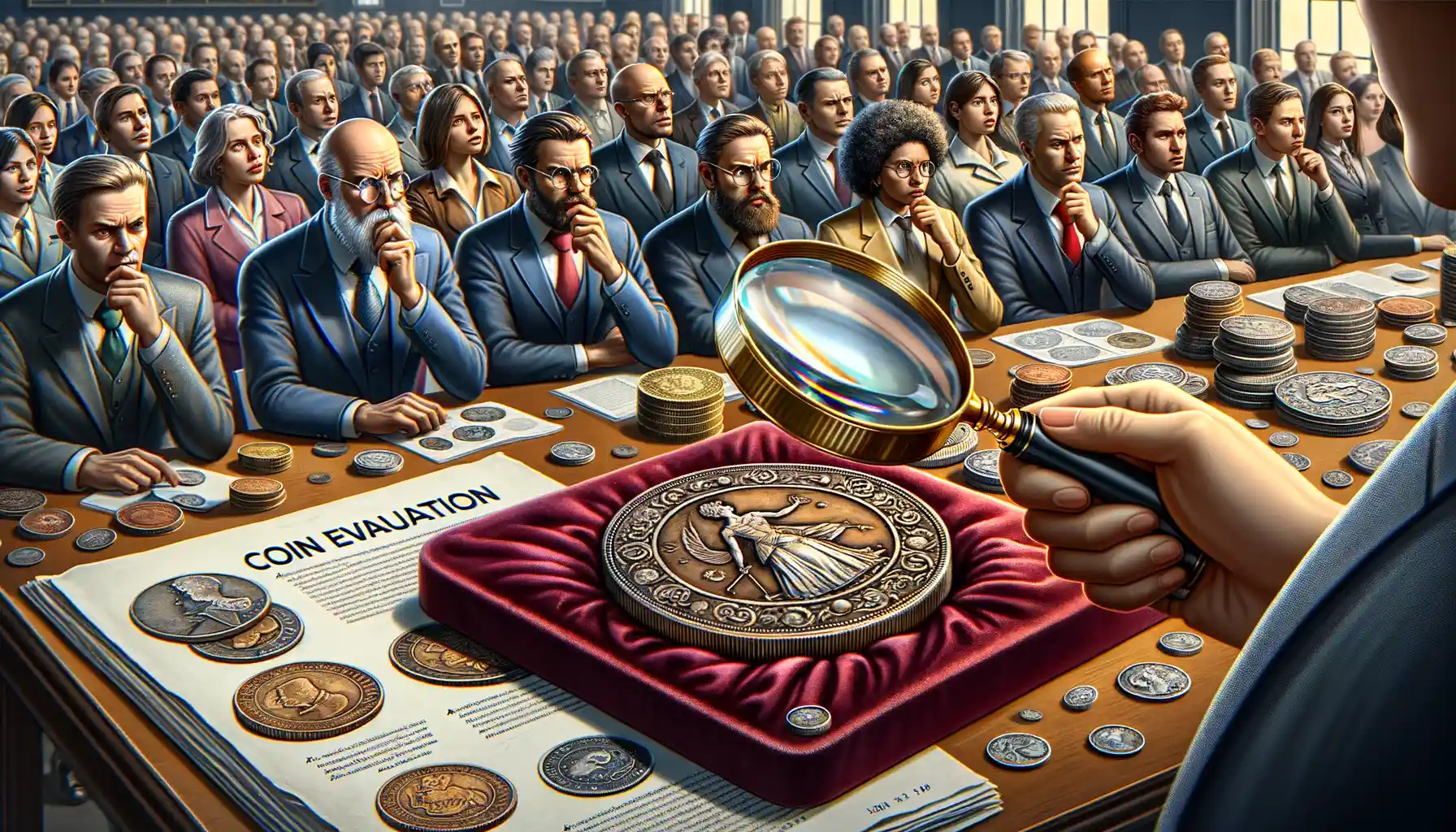Understanding Coin Auctions and Their Importance
Stepping into the world of coin auctions is like walking into a treasure trove where history, art, and value collide. It’s not just about bidding; it’s about understanding the fascinating stories behind those shimmering bits of metal. Whether it’s a Roman coin that survived centuries or a rare misprinted penny that defied minting perfection, each piece has a heartbeat of its own.
Why Coin Auctions Matter
Coin auctions are a unique marketplace where collectors, enthusiasts, and investors come together to trade more than just currency—they trade passion and expertise. Think of it as a live theater where every bidder plays a role, from the cautious observer to the die-hard collector. For many, these auctions are the ultimate stage to discover coins they’d never find in local shops or online listings. And let’s not forget the thrill of the chase—hearing the auctioneer call out bids while your heart races faster with every increment.
Reasons People Flock to Coin Auctions
- Scarcity: Rare coins often make their grand appearances at auctions, catching the eyes of serious collectors.
- Unpredictable prices: Sometimes, a keen bidder snags an incredible deal; other times, a bidding war drives up the value.
- Camaraderie: These events often feel like a reunion of kindred spirits who share a love for history encapsulated in coins.
If you’ve ever held a coin and wondered about the hands it’s passed through or the eras it’s survived, a coin auction is where such mysteries come alive. It’s a gateway to understanding not just monetary value but the intangible worth of timeless stories.
How to Participate in a Coin Auction

Getting Ready for the Auction Adventure
So, you’re ready to dive into the mesmerizing world of coin auctions? Let’s get you prepared! First things first: choose your auction wisely. Are you joining an in-person event, or are you venturing online to bid from the comfort of your couch? Whichever you decide, research is your best friend. Look up the auction house’s reputation, past coin sales, and how they handle bids—it’s like reading reviews before picking a restaurant, but with treasures on the line.
Next, register early. Most auctions require you to sign up beforehand—don’t wait until the last minute and risk missing out. Remember, you’ll probably need documents like a government ID and payment details. Got all that set up? Great. Now, familiarize yourself with the coin catalog. This is where the magic starts! Scan through the selection, mark items that intrigue you, and make a priority list. Are you hunting for a rare 1909-S VDB Lincoln Cent or a simple silver dollar to start your collection?
Placing Bids (Without Losing Your Shirt)
Bidding at a coin auction is a rush, no doubt. But remember, this isn’t Monopoly money; it’s real cash on the table. Set a budget before the auction begins. Think of it as a financial seatbelt—it keeps you from overspending in the heat of the moment.
Here’s a quick cheat sheet for smooth bidding:
- Check if there’s a “buyer’s premium.” This hidden fee can increase the final price by 10-20%!
- Start small—place bids tactically, not emotionally. Getting swept up in a bidding war can feel thrilling, but it’s a slippery slope.
- Understand increments! Some auctions jump in $10, others by hundreds. Pay attention to avoid unexpected leaps.
Online participants, keep an eye on lag times or tech glitches—nothing’s worse than missing out because your screen froze mid-bid! And for those attending in person, watch the auctioneer closely; their rapid-fire calls and subtle signals are like a secret language that you’ll soon grow addicted to deciphering.
Key Tips for Evaluating Coins at an Auction

Spotting Value: What to Look for in a Coin
Evaluating coins at an auction is like deciphering a treasure map—you need sharp eyes and a touch of curiosity. First, get up close and personal with the coin’s condition. Does it gleam like a star in the night sky or show signs of wear from its journey through centuries? Coins in better condition (often graded as “Mint State” or “Uncirculated”) tend to fetch higher values.
Next, pay attention to rarity. Think about it—wouldn’t you cherish a coin that only a handful of people on Earth possess? Research mintage numbers and any fascinating twists in history that may make the piece scarce. For example, wartime issues often have unique stories attached. Bonus tip: rarity doesn’t always scream “ancient”; a modern coin with an unusual error can be just as valuable.
The Power of Details: Things You Don’t Want to Miss
When you’re inspecting a coin, every detail matters. Have a checklist ready:
- Date and Mint Mark: Is the coin from a specific historical period? Was it minted in a sought-after city?
- Engraving: Are there intricate, well-preserved designs? Faded patterns may signal extensive circulation.
- Patina: That natural sheen can indicate authenticity. Be wary of coins that look overly polished—it’s often a red flag.
Lastly, trust your instincts but don’t ignore expert advice. Consider consulting a numismatist if something feels too good to be true. Auctions can be thrilling, but preparation is your secret weapon for turning bids into brag-worthy wins!
Common Mistakes to Avoid in Coin Auctions

Skipping Research: The Recipe for Regret
Picture this: you walk into a coin auction, spot a shiny treasure, and feel your heart racing. Without a second thought, you place a bid—and win! Fast forward to later, when you discover the coin is worth half as much as you paid. Ouch.
One common blunder? Neglecting research. Never assume every coin is a gem just because it’s on display. Look up its history, rarity, and market value. And don’t forget to check whether it has been graded by reputable organizations like NGC or PCGS. Their certification can be a lifeboat in a sea of fakes and overvalued items.
Bidding Like You’re in a Movie
Adrenaline is a sneaky liar at auctions. It can push you to overbid, especially when your competitive streak kicks in. Resist the urge to “win” at any cost—your wallet will thank you.
To keep emotions in check:
- Set a budget beforehand and stick to it like glue.
- Watch for cues from seasoned bidders. They aren’t usually bidding on impulse.
Remember: it’s an auction, not a blockbuster bidding war! Keep your cool, and you’ll avoid walking out with buyer’s remorse.
Conclusion and Takeaways for Beginners

What Makes First Steps in Coin Auctions Exciting?
Diving into the world of coin auctions for the first time is like opening a treasure chest—you never know what gems you’ll uncover. But let’s be real: it can feel overwhelming too. The chatter of the auctioneer, the ticking clock, the thrill of competition—it’s a lot to take in! That’s why knowing the basics isn’t just helpful; it’s your superpower.
As a beginner, think of coin auctions as an adventure rather than a race. Nobody masters this craft overnight, and every auction is a chance to sharpen your instincts. Remember, even seasoned collectors once made rookie mistakes. Forgot to research a coin’s value? Overbid on impulse? We’ve all been there. Growth comes from learning.
Here are some quick takeaways to keep in mind:
- Start small: Bid on lower-value coins to get comfortable with the process.
- Stay curious: Ask questions, read catalogs thoroughly, and use every auction as a lesson.
- Set limits: Decide in advance how much you’re willing to spend—and stick to it!
Why You’re Building More Than a Collection
Coin auctions aren’t just about collecting metal discs; they’re about uncovering stories, connecting with history, and joining a passionate community. When you land your first coin, don’t just see its monetary value—imagine its journey. Did it travel across empires? Was it tucked in someone’s pocket centuries ago?
So, take a deep breath and enjoy the ride. Your collection, no matter how small it begins, is a testament to your curiosity and growing expertise. That’s something no auction hammer can ever take away.